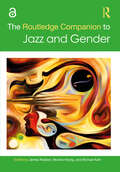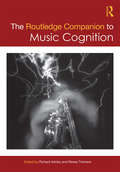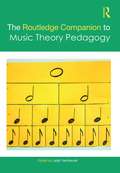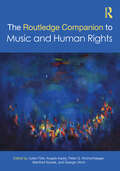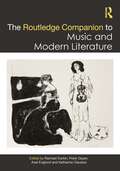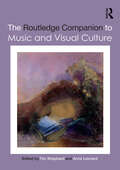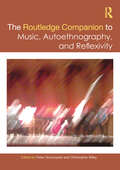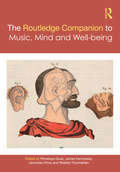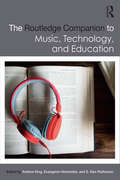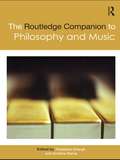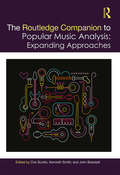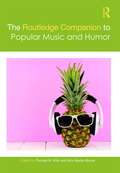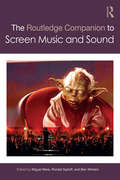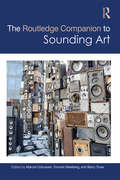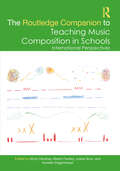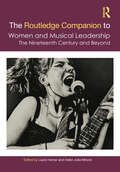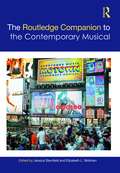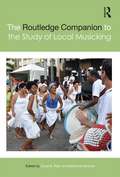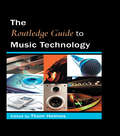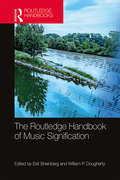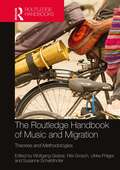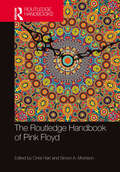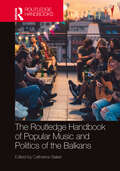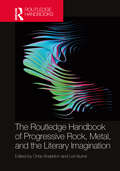- Table View
- List View
The Routledge Companion to Jazz and Gender (Routledge Music Companions)
by Monika Herzig Michael Kahr James ReddanThe Routledge Companion to Jazz and Gender identifies, defines, and interrogates the construct of gender in all forms of jazz, jazz culture, and education, shaping and transforming the conversation in response to changing cultural and societal norms across the globe. Such interrogation requires consideration of gender from multiple viewpoints, from scholars and artists at various points in their careers. This edited collection of 38 essays gathers the diverse perspectives of contributors from four continents, exploring the nuanced (and at times controversial) construct of gender as it relates to jazz music, in the past and present, in four parts: Historical Perspectives Identity and Culture Society and Education Policy and Advocacy Acknowledging the art form’s troubled relationship with gender, contributors seek to define the construct to include all possible definitions—not only female and male—without binary limitations, contextualizing gender and jazz in both place and time. As gender identity becomes an increasingly important consideration in both education and scholarship, The Routledge Companion to Jazz and Gender provides a broad and inclusive resource of research for the academic community, addressing an urgent need to reconcile the construct of gender in jazz in all its forms.
The Routledge Companion to Music Cognition (Routledge Music Companions)
by Renee Timmers Richard AshleyThe Routledge Companion to Music Cognition addresses fundamental questions about the nature of music from a psychological perspective. Music cognition is presented as the field that investigates the psychological, physiological, and physical processes that allow music to take place, seeking to explain how and why music has such powerful and mysterious effects on us. This volume provides a comprehensive overview of research in music cognition, balancing accessibility with depth and sophistication. A diverse range of global scholars—music theorists, musicologists, pedagogues, neuroscientists, and psychologists—address the implications of music in everyday life while broadening the range of topics in music cognition research, deliberately seeking connections with the kinds of music and musical experiences that are meaningful to the population at large but are often overlooked in the study of music cognition. Such topics include: Music’s impact on physical and emotional health Music cognition in various genres Music cognition in diverse populations, including people with amusia and hearing impairment The relationship of music to learning and accomplishment in academics, sport, and recreation The broader sociological and anthropological uses of music Consisting of over forty essays, the volume is organized by five primary themes. The first section, "Music from the Air to the Brain," provides a neuroscientific and theoretical basis for the book. The next three sections are based on musical actions: "Hearing and Listening to Music," "Making and Using Music," and "Developing Musicality." The closing section, "Musical Meanings," returns to fundamental questions related to music’s meaning and significance, seen from historical and contemporary perspectives. The Routledge Companion to Music Cognition seeks to encourage readers to understand connections between the laboratory and the everyday in their musical lives.
The Routledge Companion to Music Theory Pedagogy (Routledge Music Companions)
by Leigh VanHandelToday’s music theory instructors face a changing environment, one where the traditional lecture format is in decline. The Routledge Companion to Music Theory Pedagogy addresses this change head-on, featuring battle-tested lesson plans alongside theoretical discussions of music theory curriculum and course design. With the modern student in mind, scholars are developing creative new approaches to teaching music theory, encouraging active student participation within contemporary contexts such as flipped classrooms, music industry programs, and popular music studies. This volume takes a unique approach to provide resources for both the conceptual and pragmatic sides of music theory pedagogy. Each section includes thematic "anchor" chapters that address key issues, accompanied by short "topics" chapters offering applied examples that instructors can readily adopt in their own teaching. In eight parts, leading pedagogues from across North America explore how to most effectively teach the core elements of the music theory curriculum: Fundamentals Rhythm and Meter Core Curriculum Aural Skills Post-Tonal Theory Form Popular Music Who, What, and How We Teach A broad musical repertoire demonstrates formal principles that transcend the Western canon, catering to a diverse student body with diverse musical goals. Reflecting growing interest in the field, and with an emphasis on easy implementation, The Routledge Companion to Music Theory Pedagogy presents strategies and challenges to illustrate and inspire, in a comprehensive resource for all teachers of music theory.
The Routledge Companion to Music and Human Rights (SOAS Studies in Music)
by George Ulrich Manfred Nowak Angela Impey Julian Fifer Peter G. KirchschlaegerThe Routledge Companion to Music and Human Rights is a collection of case studies spanning a wide range of concerns about music and human rights in response to intensifying challenges to the well-being of individuals, peoples, and the planet. It brings forward the expertise of academic researchers, lawyers, human rights practitioners, and performing musicians who offer critical reflection on how their work might identify, inform, or advance mutual interests in their respective fields. The book is comprised of 28 chapters, interspersed with 23 ‘voices’ – portraits that focus on individuals’ intimate experiences with music in the defence or advancement of human rights – and explores the following four themes: 1) Fundamentals on music and human rights; 2) Music in pursuit of human rights; 3) Music as a means of violating human rights; 4) Human rights and music: intrinsic resonances.
The Routledge Companion to Music and Modern Literature (Routledge Music Companions)
by Rachael DurkinModern literature has always been obsessed by music. It cannot seem to think about itself without obsessing about music. And music has returned the favour. The Routledge Companion to Music and Modern Literature addresses this relationship as a significant contribution to the burgeoning field of word and music studies. The 37 chapters within consider the partnership through four lenses—the universal, opera and literature, musical and literary forms, and popular music and literature—and touch upon diverse and pertinent themes for our modern times, ranging from misogyny to queerness, racial inequality to the claimed universality of whiteness. This Companion therefore offers an essential resource for all who try to decode the musico-literary exchange.
The Routledge Companion to Music and Visual Culture (Routledge Music Companions)
by Anne Leonard Tim ShephardAs a coherent field of research, the field of music and visual culture has seen rapid growth in recent years. The Routledge Companion to Music and Visual Culture serves as the first comprehensive reference on the intersection between these two areas of study, an ideal introduction for those coming to the field for the first time as well as a useful source of information for seasoned researchers. This collection of over forty entries, from musicologists and art historians from the US and UK, delineate the key concepts in the field in five parts: Starting Points Methodologies Reciprocation – the musical in visual culture and the visual in musical culture Convergence –in metaphor, in conception, and in practice Hybrid Arts This reference work speaks to the important questions concerning this burgeoning field of research –what are the established approaches to studying musical and visual cultures side by side? What have been the major points of contact between these two areas and what kind of questions can this interdisciplinary research address moving forward? The Routledge Companion to Music and Visual Culture is an indispensable guide for anyone interested in the field of music and visual culture.
The Routledge Companion to Music and Visual Culture (Routledge Music Companions)
by Anne Leonard Tim ShephardAs a coherent field of research, the field of music and visual culture has seen rapid growth in recent years. The Routledge Companion to Music and Visual Culture serves as the first comprehensive reference on the intersection between these two areas of study, an ideal introduction for those coming to the field for the first time as well as a useful source of information for seasoned researchers. This collection of over forty entries, from musicologists and art historians from the US and UK, delineate the key concepts in the field in five parts: Starting Points Methodologies Reciprocation – the musical in visual culture and the visual in musical culture Convergence –in metaphor, in conception, and in practice Hybrid Arts This reference work speaks to the important questions concerning this burgeoning field of research –what are the established approaches to studying musical and visual cultures side by side? What have been the major points of contact between these two areas and what kind of questions can this interdisciplinary research address moving forward? The Routledge Companion to Music and Visual Culture is an indispensable guide for anyone interested in the field of music and visual culture.
The Routledge Companion to Music, Autoethnography, and Reflexivity (Routledge Music Companions)
by Christopher Wiley Peter GouzouasisThe Routledge Companion to Music, Autoethnography, and Reflexivity represents a substantial contribution to the field of writing self-reflexively about an individual’s practice within music studies. In seven sections, 22 original chapters by a diverse set of contributors consider writing about personal activities from the points of view of performance, composition, musicology, and pedagogy, drawing on a range of traditions from Western art-music to popular music to ethnomusicology. A robust critical framework is presented, with coverage of: historical and critical perspectives different methodologies and their ascendancy within the academy leading debates, issues, and approaches future directions The Companion cultivates new modes of engagement in music research, enabling scholars and practitioners at all levels to identify and articulate their relationship to the wider sociocultural contexts in which they operate.
The Routledge Companion to Music, Mind, and Well-being (Routledge Music Companions)
by James Kennaway Jacomien Prins Penelope Gouk Wiebke ThormahlenIn recent decades, the relationship between music, emotions, health and well-being has become a hot topic. Scientific research and new neuro-imaging technologies have provided extraordinary new insights into how music affects our brains and bodies, and researchers in fields ranging from psychology and music therapy to history and sociology have turned their attention to the question of how music relates to mind, body, feelings and health, generating a wealth of insights as well as new challenges. Yet this work is often divided by discipline and methodology, resulting in parallel, yet separate discourses. In this context, The Routledge Companion to Music, Mind and Well-being seeks to foster truly interdisciplinary approaches to key questions about the nature of musical experience and to demonstrate the importance of the conceptual and ideological frameworks underlying research in this field. Incorporating perspectives from musicology, history, psychology, neuroscience, music education, philosophy, sociology, linguistics and music therapy, this volume opens the way for a generative dialogue across both scientific and humanistic scholarship. The Companion is divided into two sections. The chapters in the first, historical section consider the varied ways in which music, the emotions, well-being and their interactions have been understood in the past, from Antiquity to the twentieth century, shedding light on the intellectual origins of debates that continue today. The chapters in the second, contemporary section offer a variety of current scientific perspectives on these topics and engage wider philosophical problems. The Companion ends with chapters that explore the practical application of music in healthcare, education and welfare, drawing on work on music as a social and ecological phenomenon. Contextualising contemporary scientific research on music within the history of ideas, this volume provides a unique overview of what it means to study music in relation to the mind and well-being.
The Routledge Companion to Music, Technology, and Education (Routledge Music Companions)
by Andrew King Evangelos Himonides S. Alex RuthmannThe Routledge Companion to Music, Technology, and Education is a comprehensive resource that draws together burgeoning research on the use of technology in music education around the world. Rather than following a procedural how-to approach, this companion considers technology, musicianship, and pedagogy from a philosophical, theoretical, and empirically-driven perspective, offering an essential overview of current scholarship while providing support for future research. The 37 chapters in this volume consider the major aspects of the use of technology in music education: Part I. Contexts. Examines the historical and philosophical contexts of technology in music. This section addresses themes such as special education, cognition, experimentation, audience engagement, gender, and information and communication technologies. Part II. Real Worlds. Discusses real world scenarios that relate to music, technology, and education. Topics such as computers, composition, performance, and the curriculum are covered here. Part III. Virtual Worlds. Explores the virtual world of learning through our understanding of media, video games, and online collaboration. Part IV. Developing and Supporting Musicianship. Highlights the framework for providing support and development for teachers, using technology to understand and develop musical understanding. The Routledge Companion to Music, Technology, and Education will appeal to undergraduate and post-graduate students, music educators, teacher training specialists, and music education researchers. It serves as an ideal introduction to the issues surrounding technology in music education.
The Routledge Companion to Philosophy and Music (Routledge Philosophy Companions)
by Theodore Gracyk Andrew KaniaThe Routledge Companion to Philosophy and Music is an outstanding guide and reference source to the key topics, subjects, thinkers and debates in philosophy and music. Over fifty entries by an international team of contributors are organised into six clear sections: general issues emotion history figures kinds of music music, philosophy and related disciplines The Routledge Companion to Philosophy and Music is essential reading for anyone interested in philosophy, music and musicology.
The Routledge Companion to Popular Music Analysis: Expanding Approaches (Routledge Music Companions)
by Ciro Scotto Kenneth M. Smith John BrackettThe Routledge Companion to Popular Music Analysis: Expanding Approaches widens the scope of analytical approaches for popular music by incorporating methods developed for analyzing contemporary art music. This study endeavors to create a new analytical paradigm for examining popular music from the perspective of developments in contemporary art music. "Expanded approaches" for popular music analysis is broadly defined as as exploring the pitch-class structures, form, timbre, rhythm, or aesthetics of various forms of popular music in a conceptual space not limited to the domain of common practice tonality but broadened to include any applicable compositional, analytical, or theoretical concept that illuminates the music. The essays in this collection investigate a variety of analytical, theoretical, historical, and aesthetic commonalities popular music shares with 20th and 21st century art music. From rock and pop to hip hop and rap, dance and electronica, from the 1930s to present day, this companion explores these connections in five parts: Establishing and Expanding Analytical Frameworks Technology and Timbre Rhythm, Pitch, and Harmony Form and Structure Critical Frameworks: Analytical, Formal, Structural, and Political With contributions by established scholars and promising emerging scholars in music theory and historical musicology from North America, Europe, and Australia, The Routledge Companion to Popular Music Analysis: Expanding Approaches offers nuanced and detailed perspectives that address the relationships between concert and popular music.
The Routledge Companion to Popular Music and Humor (Routledge Music Companions)
by Thomas M. Kitts Nick Baxter-MooreAn essential part of human expression, humor plays a role in all forms of art, and humorous and comedic aspects have always been part of popular music. For the first time, The Routledge Companion to Popular Music and Humor draws together scholarship exploring how the element of humor interacts with the artistic and social aspects of the musical experience. Discussing humor in popular music across eras from Tin Pan Alley to the present, and examining the role of humor in different musical genres, case studies of artists, and media forms, this volume is a groundbreaking collection that provides a go-to reference for scholars in music, popular culture, and media studies. While most scholars, when considering humor’s place in popular music, tend to focus on more "literate" forms, the contributors in this collection seek to fill in the gaps by surveying all kinds of humor, critical theories, and popular musics. Across eight parts, the essays in this collection explore topics both highbrow and low, including: Parody and satire Humor in rock and global music Gender, sexuality, and politics The music mockumentary Novelty songs Humor has long been a fixture of the popular music soundscape, whether on stage, in performance, on record, or on film. The Routledge Companion to Popular Music and Humor covers it all, presenting itself as the most comprehensive treatment of the topic to date.
The Routledge Companion to Screen Music and Sound
by Ben Winters Miguel Mera Ronald SadoffThe Routledge Companion to Screen Music and Sound provides a detailed and comprehensive overview of screen music and sound studies, addressing the ways in which music and sound interact with forms of narrative media such as television, videogames, and film. The inclusive framework of "screen music and sound" allows readers to explore the intersections and connections between various types of media and music and sound, reflecting the current state of scholarship and the future of the field. A diverse range of international scholars have contributed an impressive set of forty-six chapters that move from foundational knowledge to cutting edge topics that highlight new key areas. The companion is thematically organized into five cohesive areas of study: Issues in the Study of Screen Music and Sound—discusses the essential topics of the discipline Historical Approaches—examines periods of historical change or transition Production and Process—focuses on issues of collaboration, institutional politics, and the impact of technology and industrial practices Cultural and Aesthetic Perspectives—contextualizes an aesthetic approach within a wider framework of cultural knowledge Analyses and Methodologies—explores potential methodologies for interrogating screen music and sound Covering a wide range of topic areas drawn from musicology, sound studies, and media studies, The Routledge Companion to Screen Music and Sound provides researchers and students with an effective overview of music’s role in narrative media, as well as new methodological and aesthetic insights.
The Routledge Companion to Sounding Art (Routledge Music Companions)
by Marcel Cobussen Vincent Meelberg Barry TruaxThe Routledge Companion to Sounding Art presents an overview of the issues, methods, and approaches crucial for the study of sound in artistic practice. Thirty-six essays cover a variety of interdisciplinary approaches to studying sounding art from the fields of musicology, cultural studies, sound design, auditory culture, art history, and philosophy. The companion website hosts sound examples and links to further resources. The collection is organized around six main themes: Sounding Art: The notion of sounding art, its relation to sound studies, and its evolution and possibilities. Acoustic Knowledge and Communication: How we approach, study, and analyze sound and the challenges of writing about sound. Listening and Memory: Listening from different perspectives, from the psychology of listening to embodied and technologically mediated listening. Acoustic Spaces, Identities and Communities: How humans arrange their sonic environments, how this relates to sonic identity, how music contributes to our environment, and the ethical and political implications of sound. Sonic Histories: How studying sounding art can contribute methodologically and epistemologically to historiography. Sound Technologies and Media: The impact of sonic technologies on contemporary culture, electroacoustic innovation, and how the way we make and access music has changed. With contributions from leading scholars and cutting-edge researchers, The Routledge Companion to Sounding Art is an essential resource for anyone studying the intersection of sound and art.
The Routledge Companion to Teaching Music Composition in Schools: International Perspectives (Routledge Music Companions)
by Martin Fautley Kirsty Devaney Joana Grow Annette ZiegenmeyerThe Routledge Companion to Teaching Music Composition in Schools: International Perspectives offers a comprehensive overview of teaching composing from a wide range of countries around the world. Addressing the current state of composition pedagogy from primary to secondary school levels and beyond, the volume explores issues, including different curricular and extracurricular settings, cultural aspects of composing, aesthetics, musical creativity, the role of technology, and assessment. With contributors from over 30 countries, this volume encompasses theoretical, historical, empirical, and practical approaches and enables comparisons across different countries and regions. Chapters by experienced educators, composers, and researchers describe in depth the practices taking place in different international locations. Interspersed with these chapters, interludes by the volume editors contextualize and problematize the teaching and learning of composing music. The volume covers a range of contexts, including formal and informal, those where a national curriculum is mandated or where composing is a matter of choice, and a range of types, styles, and genres of musical learning and music-making. Providing a wide-ranging and detailed review of international approaches to incorporating music composition in teaching and learning, this volume will be a useful resource for teachers, music education researchers, graduate and undergraduate students, and all those working with children and young people in composing music.
The Routledge Companion to Women and Musical Leadership: The Nineteenth Century and Beyond (Routledge Music Companions)
by Helen Julia Minors Laura HamerThe Routledge Companion to Women and Musical Leadership: The Nineteenth Century and Beyond provides a comprehensive exploration of women’s participation in musical leadership from the nineteenth century to the present. Global in scope, with contributors from over thirty countries, this book reveals the wide range of ways in which women have taken leadership roles across musical genres and contexts, uncovers new histories, and considers the challenges that women continue to face.The volume addresses timely issues in the era of movements such as #MeToo, digital feminisms, and the resurgent global feminist movements. Its multidisciplinary chapters represent a wide range of methodologies, with historical musicology, models drawn from ethnomusicology, analysis, philosophy, cultural studies, and practice research all informing the book. Including almost fifty chapters written by both researchers and practitioners in the field, it covers themes including: Historical Perspectives Conductors and Impresarios Women’s Practices in Music Education Performance and the Music Industries Faith and Spirituality: Worship and Sacred Musical Practices Advocacy: Collectives and Grass-Roots Activism The Routledge Companion to Women and Musical Leadership: The Nineteenth Century and Beyond draws together both new perspectives from early career researchers and contributions from established world-leading scholars. It promotes academic-practitioner dialogue by bringing contributions from both fields together, represents alternative models of women in musical leadership, celebrates the work done by women leaders, and shows how women challenge accepted notions of gendered roles. Offering a comprehensive overview of the varied forms of women’s musical leadership, this volume is a vital resource for all scholars of women in music, as well as professionals in the music industries and music education today.
The Routledge Companion to the Contemporary Musical (Routledge Music Companions)
by Elizabeth L. Wollman Jessica SternfeldThe Routledge Companion to the Contemporary Musical is dedicated to the musical’s evolving relationship to American culture in the late twentieth and early twenty-first centuries. In the past decade-and-a-half, international scholars from an ever-widening number of disciplines and specializations have been actively contributing to the interdisciplinary field of musical theater studies. Musicals have served not only to mirror the sociopolitical, economic, and cultural tenor of the times, but have helped shape and influence it, in America and across the globe: a genre that may seem, at first glance, light-hearted and escapist serves also as a bold commentary on society. Forty-four essays examine the contemporary musical as an ever-shifting product of an ever-changing culture. This volume sheds new light on the American musical as a thriving, contemporary performing arts genre, one that could have died out in the post-Tin Pan Alley era but instead has managed to remain culturally viable and influential, in part by newly embracing a series of complex contradictions. At present, the American musical is a live, localized, old-fashioned genre that has simultaneously developed into an increasingly globalized, tech-savvy, intensely mediated mass entertainment form. Similarly, as it has become increasingly international in its scope and appeal, the stage musical has also become more firmly rooted to Broadway—the idea, if not the place—and thus branded as a quintessentially American entertainment.
The Routledge Companion to the Study of Local Musicking (Routledge Music Companions)
by Suzel A. Reily Katherine BrucherThe Routledge Companion to the Study of Local Musicking provides a reference to how, cross-culturally, musicking constructs locality and how locality is constructed by the musicking that takes place within it, that is, how people engage with ideas of community and place through music. The term "musicking" has gained currency in music studies, and refers to the diverse ways in which people engage with music, regardless of the nature of this engagement. By linking musicking to the local, this book highlights the ways in which musical practices and discourses interact with people’s everyday experiences and understandings of their immediate environment, their connections and commitment to that locality, and the people who exist within it. It explores what makes local musicking "local." By viewing musicking from the perspective of where it takes place, the contributions in this collection engage with debates on the processes of musicking, identity construction, community-building and network formation, competitions and rivalries, place and space making, and local-global dynamics.
The Routledge Guide to Music Technology
by Thom HolmesFirst published in 2006. This guide is an A to Z trade reference aimed at music students, technophiles and audio-video computer users. The world of music technology has exploded over the last decades thanks to introductions of new digital formats. At the same time there has been a renaissance in analog high fidelity equipment and resurgent interest in turntables, long playing records and vintage stereo systems. Music students, collectors and consumers will appreciate the availability of a guide to all things musical in the technological universe.
The Routledge Handbook of Music Signification
by Esti Sheinberg William P. DoughertyThe Routledge Handbook of Music Signification captures the richness and complexity of the field, presenting 30 essays by recognized international experts that reflect current interdisciplinary and cross-disciplinary approaches to the subject. Examinations of music signification have been an essential component in thinking about music for millennia, but it is only in the last few decades that music signification has been established as an independent area of study. During this time, the field has grown exponentially, incorporating a vast array of methodologies that seek to ground how music means and to explore what it may mean. Research in music signification typically embraces concepts and practices imported from semiotics, literary criticism, linguistics, the visual arts, philosophy, sociology, history, and psychology, among others. By bringing together such approaches in transparent groupings that reflect the various contexts in which music is created and experienced, and by encouraging critical dialogues, this volume provides an authoritative survey of the discipline and a significant advance in inquiries into music signification. This book addresses a wide array of readers, from scholars who specialize in this and related areas, to the general reader who is curious to learn more about the ways in which music makes sense.
The Routledge Handbook of Music and Migration: Theories and Methodologies (Routledge Music Handbooks)
by Nils Grosch Wolfgang Gratzer Ulrike Präger Susanne ScheiblhoferThe Routledge Handbook of Music and Migration: Theories and Methodologies is a progressive, transdisciplinary paradigm-shifting core text for music and migration studies. Conceptualized as a comprehensive methodological and theoretical guide, it foregrounds the mobile potentials of music and presents key arguments about why musical expressions matter in the discussion of migration politics. 24 international specialists in music and migration set methodological and theoretical standards for transdisciplinary collaborations in the field of migration studies, discussing 41 keywords, such as mobility, community, research ethics, human rights, and critical whiteness in the context of music and migration. The authors then apply these terms to 16 chapters, which deal with ethnomusicological, musicological, sociological, anthropological, geographical, pedagogical, political, economic, and media-related methodologies and theories which reflect and contest current discourses of migration. In their interdisciplinary focus, these chapters advance interrelations between music and migration as enabling factors for socio-cultural studies. Furthermore, the authors tackle crucial questions of agency, equality, and equity as well as the responsibilities and expectations of writers and artists when researching migration phenomena as innate human experience. As a result, this handbook provides scholars and students alike with relevant and applicable methodological and theoretical tools in addition to an extensive literature and research review for further research.
The Routledge Handbook of Pink Floyd (Routledge Music Handbooks)
by Chris Hart Simon A. MorrisonThe Routledge Handbook of Pink Floyd is intended for scholars and researchers of popular music, as well as music industry professionals and fans of the band. It brings together international researchers to assess, evaluate and reformulate approaches to the critical study and interpretation of one of the world’s most important and successful bands. For the first time, this Handbook will ‘tear down the wall,’ examining the band’s collective artistic creations and the influence of social, technological, commercial and political environments over several decades on their work. Divided into five parts, the book provides a thoroughly contextualised overview of the musical works of Pink Floyd, including coverage of performance and sound; media, reception and fandom; genre; periods of Pink Floyd’s work; and aesthetics and subjectivity. Drawing on art, design, performance, culture and counterculture, emergent theoretical resources and analytical frames are evaluated and discussed from across the social sciences, humanities and creative arts. The Handbook is intended for scholars and researchers of popular music, as well as music industry professionals. It will appeal across a range of related subjects from music production to cultural studies and media/communication studies.
The Routledge Handbook of Popular Music and Politics of the Balkans (Routledge Music Handbooks)
by Catherine BakerThe Routledge Handbook of Popular Music and Politics of the Balkans is a comprehensive overview of major topics, established debates and new directions in the study of popular music and politics in this region.The vibrant growth of this subject area since the 1990s has been intertwined with the region’s political and socio-economic transformations, including the collapse of state socialism in much of the region, the break-up of Yugoslavia, the advent of neoliberal capitalism, the rise of Romani activism, the complex politics of ‘Europeanization’ before and after the global financial crisis, and the region’s relationship to the European Union border regime. The handbook illustrates the wide range of disciplines and methods that contribute to this field’s interdisciplinary dialogue and highlights emerging approaches such as the study of Black diasporas in the region, popular music’s links with LGBTQ+ communities, and the impact of digital technologies on musical cultures.This volume will benefit specialist researchers, tutors creating or refreshing courses on popular music in the region, and students interested in these topics, especially those who are at the point of developing their own independent research projects.
The Routledge Handbook of Progressive Rock, Metal, and the Literary Imagination (Routledge Music Handbooks)
by Chris Anderton and Lori BurnsThis Handbook illustrates the many ways that progressive rock and metal music forge striking engagements with literary texts and themes.The authors and their objects of analytic inquiry offer global and diverse perspectives on these genres and their literary connections: from ancient times to the modern world, from children’s literature to epic poetry, from mythology to science fiction, and from esoteric fantasy to harsh political criticism. The musical treatments of these literary materials span the continents from South and North America through Europe and Asia. The collection presents critical perspectives on the enduring and complex relationships between words and music as these are expressed in progressive rock and metal.The book is aimed primarily at an academic market, valuable for second- through final-year students on undergraduate courses devoted to both popular music and to literary studies, and to postgraduate programs and researchers in a range of fields, including popular music studies, musicology, creative music performance and composition, songwriting, literary studies, narrative studies, folklore studies, science fiction studies, cultural studies, liberal studies, and sociology, and for media and history courses that have an interest in the intersection of narratives, music, and society.
